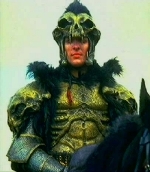PETERSBURG --Tyrannosaurus rex was a strict vegetarian, and lived with Adam and Eve in the Garden of Eden.
There were dinosaurs of every kind aboard Noah's ark. Some dinosaurs managed to hang around until just a few hundred years ago. The legend of St. George slaying the dragon? That probably was a dinosaur.
Exhibits showing all this and more will be at the Creation Museum, a $27 million religious showcase nearing completion in Northern Kentucky.
The museum, in Boone County near the Cincinnati/Northern Kentucky International Airport, is being built by a non-profit group called Answers in Genesis. It is scheduled to open on Memorial Day. Museum and Northern Kentucky tourism officials are expecting it to be a boon to the region, bringing in at least 250,000 visitors in its first year.
It already is getting media attention. Newspapers and television stations from Europe, Asia and Australia have visited, and CNN was there Friday.
But mainstream scientists, who have dubbed it The Fred and Wilma Flintstone Museum, say the museum's message is just plain wrong.
The museum is based on a literal interpretation of the Bible: The world was created in six, 24-hour days, some time between 6,000 and 10,000 years ago. Humans appeared on Day 6, and they didn't evolve from anything.
Ken Ham, an Australian who is Answers in Genesis' $120,000-a-year founder and president, says the museum opening will be a significant event in Christendom.
"No one else has ever built a place where you can experience biblical history and merge it with the science," he said.
47 percent agree
But Eugenie Scott, a former University of Kentucky anthropologist who is director of the California-based National Center for Science Education, said the information provided in the museum "is not even close to standard science."
Scott visited the museum recently as part of a British Broadcasting Corp. radio program. Although she didn't get a tour, she saw enough to know that the museum will be professionally done. And, she says, that's worrisome.
"There are going to be students coming into the classroom and saying, 'I just went to this fancy museum and everything you're telling me is rubbish,' " Scott said.
Daniel Phelps of Lexington, president of the Kentucky Paleontological Society, says the museum will embarrass the state because of the "pseudoscientific-nutty things" it espouses, and because it portrays evolution as the path to ruin.
But the Rev. Bill Henard, senior pastor of Lexington's Porter Memorial Baptist Church, said that Sunday school classes and other groups from his church are likely to visit.
"I think people will enjoy ... being able to see a different side from what some scientific findings have shown," he said.
Henard said he believes in the literal story of creation, adding that "I think you would be surprised to know how many people hold to a young-Earth creation."
More than a century and a half after British naturalist Charles Darwin published The Origin of Species, which suggested that life evolved over millions of years from one-cell organisms, quite a few people agree with Henard, pollsters say.
When the Gallup Poll asked people about their views on the subject last March, 47 percent of Americans polled said that God created humans pretty much in their present form some time in the last 10,000 years. That belief was strongest among those with less education, regular churchgoers, people 65 and older, and Republicans.
Recruiting dinosaurs
Like a natural history museum or an amusement park, the Creation Museum will use people's fascination with dinosaurs as a draw.
There will be 80 lifelike dinosaur models, some of which move their heads and tails and roar.
"The evolutionists use dinosaurs to promote their world view; we're going to use that to promote our world view," Answers in Genesis spokesman Mark Looy said.
More than 50 videos will be shown at the various exhibits, and a "special-effects" theater will have seats that shake as visitors are hit with tiny mists of water. The opening show features an animatronic young woman struggling with her belief in God, while two angels that she can't see are on the screen behind her. Ham describes it as the only part of the museum that is "lighthearted" and "edgy."
The museum has a planetarium. But its programs, unlike those at other planetariums, will say that the light from the stars we see did not take millions of years to get here.
There also is a reproduction of a portion of the Grand Canyon. The message there is that it was created very quickly, from the waters from Noah's flood. The fossils in rock layers there and in many other places around the world are of animals that drowned in the flood, the museum says.
Some of the exhibits would be the envy of any natural history museum.
There are, for example, 10,000 minerals from a collection that was donated to the museum, fossil dinosaur eggs from China that Ham says are worth $40,000, and a donated collection of dinosaur toys that has been valued at $50,000.
There also will be an exhibit suggesting that belief in evolution is the root of most of modern society's evils. It shows models of children leaving a church where the minister believes in evolution. Soon the girl is on the phone to Planned Parenthood, while the boy cruises the Internet for pornography sites.
The museum already has generated international publicity and criticism.
Comedian Bill Maher, who often mocks religion, came by last month. Looy said he snuck in for a half-hour interview with Ham, who didn't know who he was.
The museum and Answers in Genesis also are the unflattering subject of a chapter of American Fascists: The Christian Right and the War on America. The book, published last year, is by former New York Times correspondent Chris Hedges.
Tom Caradonio, president of the Northern Kentucky Convention and Visitors Commission, said the museum is expected to bring plenty of people to the region, including religious conventions.
Asked about the contention that the museum will embarrass the state, Caradonio noted that Lexington allows betting on horses at Keeneland Race Course, which some find objectionable.
"I learned a long time ago in this industry that if we had to make moral judgments, we would probably end up selling nothing," he said.
Creation Museum or ...
Moderator: Dictators in Training
76 posts • Page 1 of 4 • 1, 2, 3, 4
Creation Museum or ...
an anti-evolution museum. What would they think up next?
- Phlegm
- Nappy Headed Ho

- Posts: 6258
- Joined: Tue Aug 03, 2004 5:50 pm
Re: Creation Museum or ...
Phlegm wrote:$27 million religious showcase nearing completion in Northern Kentucky.
this should explain it.
For you


-

Evermore - NT Deity

- Posts: 4368
- Joined: Wed Mar 10, 2004 10:46 am
I'm moving this to alehouse, to start the wars.
For the record, I think this is a complete fuckin' joke, fitting for a fundamentalist shit hole place like Boone County.
For the record, I think this is a complete fuckin' joke, fitting for a fundamentalist shit hole place like Boone County.
What saves a man is to take a step. Then another step.
– C. S. Lewis
– C. S. Lewis
-

Lyion - Admin Abuse Squad

- Posts: 14376
- Joined: Wed Mar 10, 2004 1:42 pm
- Location: Ohio
I think it's really great that that fundamentalist, right wing, conservative (whatever you want to call them/us) are taking a stand against the mainstream much-so-wrong teachings.
The only part that I don't agree with is where they claim that all evil comes from the belief of evolution. Evolution is a religion just like Christianity, Hindusim, etc... The idea that this is the root of girls getting abortions and boys looking at pornography is rather rediculous.
The only part that I don't agree with is where they claim that all evil comes from the belief of evolution. Evolution is a religion just like Christianity, Hindusim, etc... The idea that this is the root of girls getting abortions and boys looking at pornography is rather rediculous.
- Markarado
- NT Veteran

- Posts: 1802
- Joined: Mon Aug 30, 2004 2:55 am
- Location: Penang, Malaysia
Evolution isnt a religion dickhead its a theory. This is a disgrace to religion and to science.
Yea dude thats something to take pride you agree with the teaching ofThere were dinosaurs of every kind aboard Noah's ark
WHITE TRASH METAL SLUMMER
Why Immortal technique?
Perhaps its because I am afraid and he gives me courage.
Why Immortal technique?
Perhaps its because I am afraid and he gives me courage.
-

Spazz - Osama bin Spazz

- Posts: 4752
- Joined: Tue Mar 16, 2004 7:29 pm
- Location: Whitebread burbs
If there were Dinosaurs on Noahs ark for 40 days and 40 nights, I wonder what other kind of animals were tehre that are extinct now from being eaten? And how did the ever so delicious cow, sheep, deer, and pig escape the wrath of the starving T Rex? Come to think of it, what did any of them eat?
Zanchief wrote:Harrison wrote:I'm not dead
Fucker never listens to me. That's it, I'm an atheist.
-

The Kizzy - NT Patron

- Posts: 15193
- Joined: Thu Mar 11, 2004 9:48 pm
- Location: In the closet with the ghosts
The difference between those you call the 'right wing, conservative, fundamentalist, etc..' and the rest of you is that we can discuss an issue even when our view points differ.
As soon as we tell you what our view point is you slam it down as idiocracy. My beliefs are my beliefs. There is just as much if not more (I'd say a lot more) evidence supporting creationism than evolution. I'm happy to discuss my beliefs, yet none of you are open minded enough to even want to learn about what others believe.
You people call yoursevles open minded
As soon as we tell you what our view point is you slam it down as idiocracy. My beliefs are my beliefs. There is just as much if not more (I'd say a lot more) evidence supporting creationism than evolution. I'm happy to discuss my beliefs, yet none of you are open minded enough to even want to learn about what others believe.
You people call yoursevles open minded

- Markarado
- NT Veteran

- Posts: 1802
- Joined: Mon Aug 30, 2004 2:55 am
- Location: Penang, Malaysia
Markarado wrote:The difference between those you call the 'right wing, conservative, fundamentalist, etc..' and the rest of you is that we can discuss an issue even when our view points differ.
As soon as we tell you what our view point is you slam it down as idiocracy. My beliefs are my beliefs. There is just as much if not more (I'd say a lot more) evidence supporting creationism than evolution. I'm happy to discuss my beliefs, yet none of you are open minded enough to even want to learn about what others believe.
You people call yoursevles open minded
ok lets discuss, I would love to hear the evidence supporting creationism
- Snero
- NT Disciple

- Posts: 761
- Joined: Mon Mar 08, 2004 1:53 am
I'll check my Bible later for the specifications of Noah's Ark. Please remember that when it comes to my belief's it doesn't have to be wordly possible. Anything is possible under God. The ark could have easily been supernatually kept together and afloat.
- Markarado
- NT Veteran

- Posts: 1802
- Joined: Mon Aug 30, 2004 2:55 am
- Location: Penang, Malaysia
76 posts • Page 1 of 4 • 1, 2, 3, 4
Who is online
Users browsing this forum: No registered users and 56 guests








